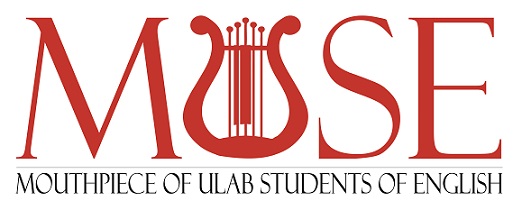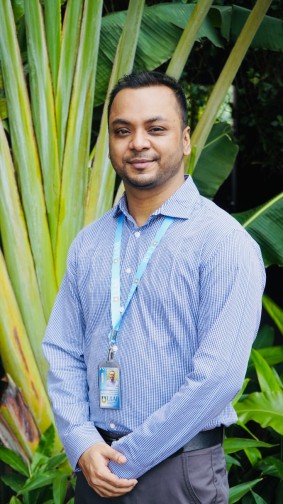By Sabah Srishty Rahman
Considering the theme for the Fall 2023 issue of MUSE, we were fortunate to have had the opportunity to talk to Dr. Abu Saleh Mohammad Rafi, a luminary whose research has contributed significantly to the landscape of linguistic studies in our country. Let us take you on an enlightening journey into the world of words.
Your reputation as a critical applied linguist, with numerous incredible publications in your field, precedes you. Why did you choose this field in particular and what first attracted you to it?
Thank you very much for your kind words. I studied English Literature in my undergrad years and first master’s degree, and then I chose to study linguistics because I wanted to gain a holistic understanding of the field (though now I realise how the field is conceptualised in Bangladesh is problematic, but that’s a topic for another interview). Furthermore, the market value of linguistics is higher than that of literature.
For the layman, can you explain one of your main focuses of research, translanguaging? In your opinion, is translanguaging being utilized effectively at ULAB? What do you think could be changed about its implementation?
One of the main focuses of translanguaging is to provide linguistic security to everyone in the classroom and in society. It welcomes all linguistic resources of speakers and opposes monolingual approaches to education and social policies. ULAB employs an English-monolingual approach in the classroom, while the outside classroom environment is very translingual, with everyone communicating using all of their linguistic resources.
If we implement translanguaging-based education policies, we bridge the gap between inside and outside classroom environments and create a linguistically secure environment. Teachers in such classrooms view students as resourceful beings in their own right, rather than as empty vessels that must be filled with a target language such as English and its associated culture. They invite students to comfortably bring all their linguistic and cultural resources and teach them how to use those resources strategically to learn about a particular language or content. Students also start to see the value of these resources in education, develop prestige around them, and challenge the hegemony of dominant languages and cultures.
This year’s Curriculum Integration program revolves around the topic of ‘Language as a Weapon’. What are some examples of language weaponization that are common on campus or during your classes? What are some ways that teachers and students alike can empower each other through language instead?
English, for its status as a global lingua franca, has been weaponised in private universities for teaching and learning. Although the economic advantages and social status that accompany this weaponisation are undeniable, it undermines the rights of our native languages, which could similarly benefit from research, education, and subsequent monetisation. Who will advocate for local languages and cultures if our universities do not? Even after 50 years of independence, we still do not have instructional materials in our own languages. While studying English is vital, disregarding our own languages and cultures is not a sustainable approach to education.
English-language-based weaponisation is also visible in classrooms. Only a few students with adequate English competence interact with teachers in a class of 40, while the rest remain silent. They, too, may have amazing ideas, but due to these imposed language barriers, they struggle to function as literate humans in an English-speaking community.
In my class, I raise awareness among students and welcome all languages and knowledge frameworks instead of blindly relying on Euro-American ones. Students gain a deeper understanding of the subjects by utilising their entire linguistic and cultural repertoires. For a more just world, they learn to respect all languages and cultures.
In your line of work, have you ever personally experienced the effects of language weaponization? How did it affect your attitude about language going forward?
I witness the effects of linguistic weaponisation every day, whether on a micro or large scale. We are overly harsh on people who deviate from the standard variety of a language, depriving them of life opportunities. For example, a student who speaks in their own local accent rather than trying to sound like speakers of some prestigious variety of a language, may not get a job even if they make great sense.
To me, it’s unfair, and I think accents of all kinds are lovely, just as you wouldn’t want your garden to be full of just one type of flower but rather a wide variety. The underlying message is that I accept people for who they are rather than trying to mould them into something that they aren’t. That’s the beauty of diversity!
How do we continue to break linguistic barriers? In your opinion, which barriers are in most need of breaking?
To break down linguistic barriers, you must first need a mutual language. I believe that functional proficiency in that language is essential. Everything else is unneeded and causes mental stress, in addition to creating an environment of privilege and discrimination. At the end of the day, ideas change the world; language is simply a tool for communicating them. So, if someone can explain their views with the linguistic resources at their disposal, we should be pleased. We don’t want to dismiss a great concept simply because the person couldn’t express it in your preferred language.
Our current issue of MUSE is centered around the theme of ‘Communication’. As a critical applied linguist, what is your take on the theme, and the importance of communication from a teacher’s perspective and a linguist’s perspective?
I sincerely appreciate the theme since it allowed me to impart my two cents. I don’t separate my work as a teacher from my work as a critical applied linguist since my research findings influence my teaching. Communication is crucial, but I focus on the ‘comfort’ component of communication, that is, how at ease a person is speaking through their language practices. I try to instill in my students the idea that expectations about language use are, like most other things, a product of social construction rather than divine revelation. This awareness gives students authority over their linguistic practices, relieving them of unnecessary stress and anxiety. They can decide where they want to conform to societal expectations and where to challenge them.
What are some memorable instances of communication or miscommunication that you have faced in your time as a student or during your career?
There are many interesting instances, actually. I will just share a ‘cross-continental’ one. It’s quite customary to address teachers by their first names in the UK and Australia, but in Bangladesh, we use “sir” or “madam”. While these words have colonial legacies, their colonial meanings have been lost. We address somebody as ‘sir’ or’ madam’ out of respect, not because they’re our colonial masters. When I went to study in the UK for the first time, I addressed one of my tutors as ‘Madam’, but that tutor didn’t like it and preferred to be called by their first name.
After returning home more than half a decade later, I addressed a senior academic as “sir” considering our local nuances, but apparently, that academic did not like it either. I found it interesting to see how our local linguistic practices are changing.
What advice would you give to those who are interested in making a career out of applied linguistics like you? Any recommended readings or inspirational quotes?
I would recommend that young people find a mentor, although I had to figure it out by myself. It was a tremendous test of will, but the payoff was well worth the effort.
There are so many interesting readings, but now I’m particularly reminded of a Nelson Mandela quote: “If you talk to a man in a language he understands, that goes to his head. If you talk to him in his own language, that goes to his heart.” It’s interesting that our current educational system fails to recognise this fundamental truth.
Where do you think, or hope, the future of applied linguistics is headed?
I often joke that whether you speak or do not speak a language, a linguist has something to do with you. Applied linguistics has an advantage over other disciplines because it is a wide field of study with numerous branches emerging on a regular basis. As a result, it’s challenging to predict where the field is heading, although I believe the current translingual turn in applied linguistics is revolutionary.

